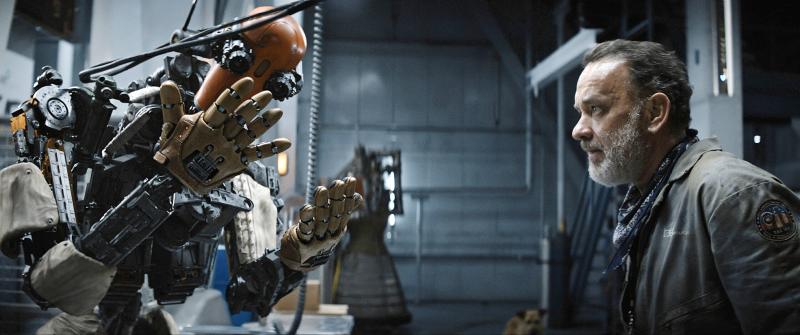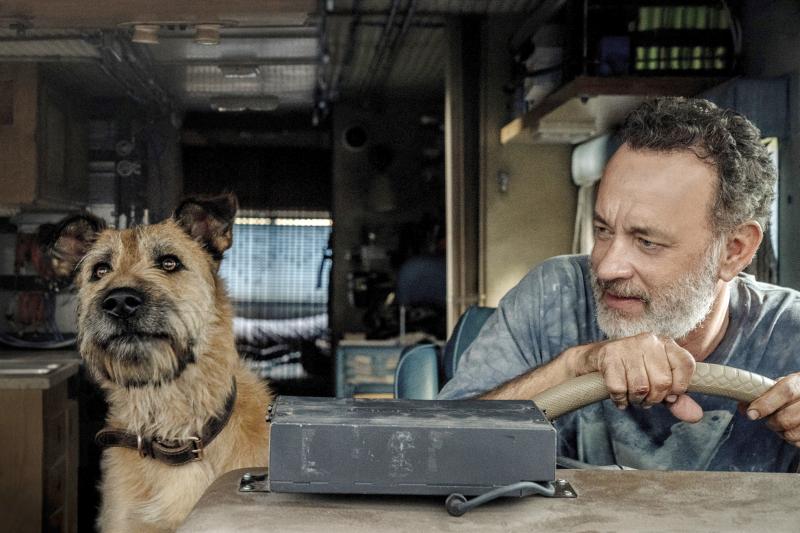Tom Hanks doesn’t need a human or even a sentient acting partner to make a film or a scene sing. Think Wilson the volleyball, Hooch and even that laptop from You’ve Got Mail. So it’s not at all surprising if he’s the first guy on the list for your post-apocalyptic film about a man, a robot and a dog.
Even less surprising is that Hanks delivers in Finch, playing a robotics engineer who is dying from radiation exposure and desperately trying to make sure his dog will be taken care of when he’s gone. It’s the kind of premise that’s been designed to pull at your heartstrings. Dying Tom Hanks and a cute pup? It’s impossible to resist. And yet somehow it doesn’t work as the epic it would like to be.
The story started out as a 20-page short about a man who builds a robot to replace him as a dog’s caretaker from a film student named Craig Luck. He wanted it to be a calling card and despite some initial rejections, his last name proved apt since his idea charmed Ivor Powell, the associate producer on Blade Runner and Alien, who co-wrote the feature, Robert Zemeckis, who produced, Hanks, Game of Thrones director Miguel Sapochnik and a major Hollywood studio (although Universal ended up selling the film to Apple TV+ during the pandemic).

Photo: AP
Here, Earth has been rendered a dusty wasteland after a solar event destroyed the ozone layer now direct sunlight is the most dangerous thing in the world. It cooks any living thing within moments of being exposed.
Unlike the stranded, solitary men of Cast Away” and The Martian, Finch has no family or home to get back to. He’s dying and the world is dying around him and he just wants to do everything he can to make sure the dog can live without him. The solution is rushed and imperfect — a robot who he’s going to have to train on the go and is only at 72 percent completion — but they’re running out of time and have to make a treacherous journey to San Francisco in an RV from the ‘80s.
This robot is impressively strong and book smart but is more teenager than obedient servant. And his accent is a cross between Russian and the Twin Peaks Black Lodge backwards speak. This is the choice made by actor Caleb Landry Jones (a nod to his appearance in the Twin Peaks revival?), who also did motion capture work to play the robot. And, well, I’m not sure if it’s the voice or how the character was written, but this robot is hard to root for. Sometimes you find yourself wishing that he’d never been introduced at all, which is not exactly the best thing when he’s one of only three characters.

Photo: AP
Finch’s scope and scale also were clearly designed for the big screen and an attentive audience, which might prove difficult on a living room television (the same felt true of Apple TV+’s other Tom Hanks epic, Greyhound, which was still a superior movie.) Although many of the visuals are quite familiar for anyone who has seen a post-apocalyptic movie in the past 20 years, they are striking and detailed nonetheless, and no doubt underserved by even the best small screen. The music cues, meanwhile, could not be more obvious (ahem, Road to Nowhere).
And it’s no one’s fault that a film with cautionary messages about delaying travel and living life while you can may be a little hard to swallow for an audience approaching year two of life in a pandemic.
But you’re probably not coming to “Finch” for lessons, you’re coming to “Finch” for Hanks. The good news is that he’s not just the reason to show up, he’s the reason to stay around as well.

Photo: AP
Finch is released today on Apple TV+. Running time: 115 minutes.

The canonical shot of an East Asian city is a night skyline studded with towering apartment and office buildings, bright with neon and plastic signage, a landscape of energy and modernity. Another classic image is the same city seen from above, in which identical apartment towers march across the city, spilling out over nearby geography, like stylized soldiers colonizing new territory in a board game. Densely populated dynamic conurbations of money, technological innovation and convenience, it is hard to see the cities of East Asia as what they truly are: necropolises. Why is this? The East Asian development model, with

June 16 to June 22 The following flyer appeared on the streets of Hsinchu on June 12, 1895: “Taipei has already fallen to the Japanese barbarians, who have brought great misery to our land and people. We heard that the Japanese occupiers will tax our gardens, our houses, our bodies, and even our chickens, dogs, cows and pigs. They wear their hair wild, carve their teeth, tattoo their foreheads, wear strange clothes and speak a strange language. How can we be ruled by such people?” Posted by civilian militia leader Wu Tang-hsing (吳湯興), it was a call to arms to retake

This is a deeply unsettling period in Taiwan. Uncertainties are everywhere while everyone waits for a small army of other shoes to drop on nearly every front. During challenging times, interesting political changes can happen, yet all three major political parties are beset with scandals, strife and self-inflicted wounds. As the ruling party, the Democratic Progressive Party (DPP) is held accountable for not only the challenges to the party, but also the nation. Taiwan is geopolitically and economically under threat. Domestically, the administration is under siege by the opposition-controlled legislature and growing discontent with what opponents characterize as arrogant, autocratic

When Lisa, 20, laces into her ultra-high heels for her shift at a strip club in Ukraine’s Kharkiv, she knows that aside from dancing, she will have to comfort traumatized soldiers. Since Russia’s 2022 invasion, exhausted troops are the main clientele of the Flash Dancers club in the center of the northeastern city, just 20 kilometers from Russian forces. For some customers, it provides an “escape” from the war, said Valerya Zavatska — a 25-year-old law graduate who runs the club with her mother, an ex-dancer. But many are not there just for the show. They “want to talk about what hurts,” she